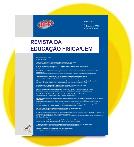<b>Validity of self-reported weight and height for the diagnosis of the nutritional state in adolescents</b> - doi: 10.4025/reveducfis.v22i1.9237
Keywords:
Nutritional State. Body Mass Index. Adolescent.
Abstract
The objective of this study was to analyze the validity of the self-reported measures of weight and height for the diagnosis of the nutritional state of adolescents. This is a transversal study of population basis, with 989 students, between 12 and 18 years old. The information of related weight and height were collected through a questionnaire and the measures were obtained later. It was found an under estimative in relation to the weight and an over estimative for the height, in both genders (p<0.05). The body mass index (BMI) related was overestimated in boys (0.2 kg/m2) and underestimated in girls (- 0.3 kg/m2). The nutritional state influenced significantly the error on the BMI related (p<0.05). In adolescents presenting low weight, there was an over estimative related to the BMI and, in individuals with overweight and obesity there was a sub estimative (p<0.05). Thus, the use of the cited measures of weight and height in adolescents is valid for eutrophic adolescents, but not apparently valid for adolescent with overweight/obesity, taking into account that this population under estimated the prevalence of overweight/obesity.Downloads
Download data is not yet available.
Metrics
Metrics Loading ...
Published
2011-04-02
How to Cite
1.
Dellagrana RA, Rech CR, Araújo ED da S, Kalinowski FG. <b>Validity of self-reported weight and height for the diagnosis of the nutritional state in adolescents</b> - doi: 10.4025/reveducfis.v22i1.9237. JPhysEduc (Maringá) [Internet]. 2011Apr.2 [cited 2026Jan.12];22(1):37-5. Available from: https://periodicos.uem.br/ojs/index.php/RevEducFis/article/view/9237
Issue
Section
Original Articles
• Authors retain the copyright and full publishing rights without restrictions.

This work is licensed under a Creative Commons Attribution 4.0 International License.









_1502.jpg)











